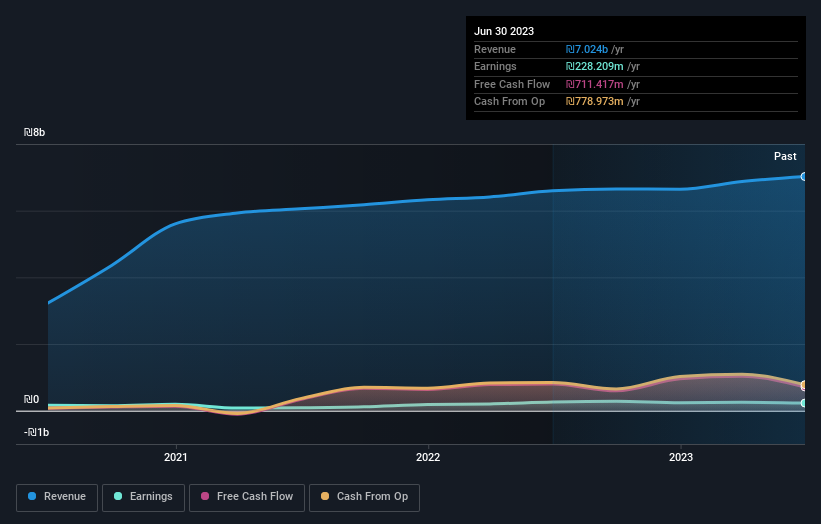- Israel
- /
- Energy Services
- /
- TASE:LAPD
Lapidoth Capital Ltd (TLV:LAPD) adds ₪227m in market cap and insiders have a 64% stake in that gain

Key Insights
- Significant insider control over Lapidoth Capital implies vested interests in company growth
- 64% of the company is held by a single shareholder (Ya'akov Luxenburg)
- 21% of Lapidoth Capital is held by Institutions
To get a sense of who is truly in control of Lapidoth Capital Ltd (TLV:LAPD), it is important to understand the ownership structure of the business. We can see that individual insiders own the lion's share in the company with 64% ownership. Put another way, the group faces the maximum upside potential (or downside risk).
As a result, insiders were the biggest beneficiaries of last week’s 5.9% gain.
Let's delve deeper into each type of owner of Lapidoth Capital, beginning with the chart below.
Check out our latest analysis for Lapidoth Capital

What Does The Institutional Ownership Tell Us About Lapidoth Capital?
Institutional investors commonly compare their own returns to the returns of a commonly followed index. So they generally do consider buying larger companies that are included in the relevant benchmark index.
Lapidoth Capital already has institutions on the share registry. Indeed, they own a respectable stake in the company. This implies the analysts working for those institutions have looked at the stock and they like it. But just like anyone else, they could be wrong. If multiple institutions change their view on a stock at the same time, you could see the share price drop fast. It's therefore worth looking at Lapidoth Capital's earnings history below. Of course, the future is what really matters.

Hedge funds don't have many shares in Lapidoth Capital. Ya'akov Luxenburg is currently the largest shareholder, with 64% of shares outstanding. With such a huge stake in the ownership, we infer that they have significant control of the future of the company. Meanwhile, the second and third largest shareholders, hold 15% and 1.8%, of the shares outstanding, respectively.
While studying institutional ownership for a company can add value to your research, it is also a good practice to research analyst recommendations to get a deeper understand of a stock's expected performance. Our information suggests that there isn't any analyst coverage of the stock, so it is probably little known.
Insider Ownership Of Lapidoth Capital
The definition of company insiders can be subjective and does vary between jurisdictions. Our data reflects individual insiders, capturing board members at the very least. Management ultimately answers to the board. However, it is not uncommon for managers to be executive board members, especially if they are a founder or the CEO.
Most consider insider ownership a positive because it can indicate the board is well aligned with other shareholders. However, on some occasions too much power is concentrated within this group.
Our information suggests that insiders own more than half of Lapidoth Capital Ltd. This gives them effective control of the company. Insiders own ₪2.6b worth of shares in the ₪4.1b company. That's extraordinary! Most would argue this is a positive, showing strong alignment with shareholders. You can click here to see if they have been selling down their stake.
General Public Ownership
With a 15% ownership, the general public, mostly comprising of individual investors, have some degree of sway over Lapidoth Capital. This size of ownership, while considerable, may not be enough to change company policy if the decision is not in sync with other large shareholders.
Next Steps:
It's always worth thinking about the different groups who own shares in a company. But to understand Lapidoth Capital better, we need to consider many other factors. For instance, we've identified 1 warning sign for Lapidoth Capital that you should be aware of.
Of course this may not be the best stock to buy. So take a peek at this free free list of interesting companies.
NB: Figures in this article are calculated using data from the last twelve months, which refer to the 12-month period ending on the last date of the month the financial statement is dated. This may not be consistent with full year annual report figures.
New: AI Stock Screener & Alerts
Our new AI Stock Screener scans the market every day to uncover opportunities.
• Dividend Powerhouses (3%+ Yield)
• Undervalued Small Caps with Insider Buying
• High growth Tech and AI Companies
Or build your own from over 50 metrics.
Have feedback on this article? Concerned about the content? Get in touch with us directly. Alternatively, email editorial-team (at) simplywallst.com.
This article by Simply Wall St is general in nature. We provide commentary based on historical data and analyst forecasts only using an unbiased methodology and our articles are not intended to be financial advice. It does not constitute a recommendation to buy or sell any stock, and does not take account of your objectives, or your financial situation. We aim to bring you long-term focused analysis driven by fundamental data. Note that our analysis may not factor in the latest price-sensitive company announcements or qualitative material. Simply Wall St has no position in any stocks mentioned.
About TASE:LAPD
Excellent balance sheet with questionable track record.
Market Insights
Community Narratives



